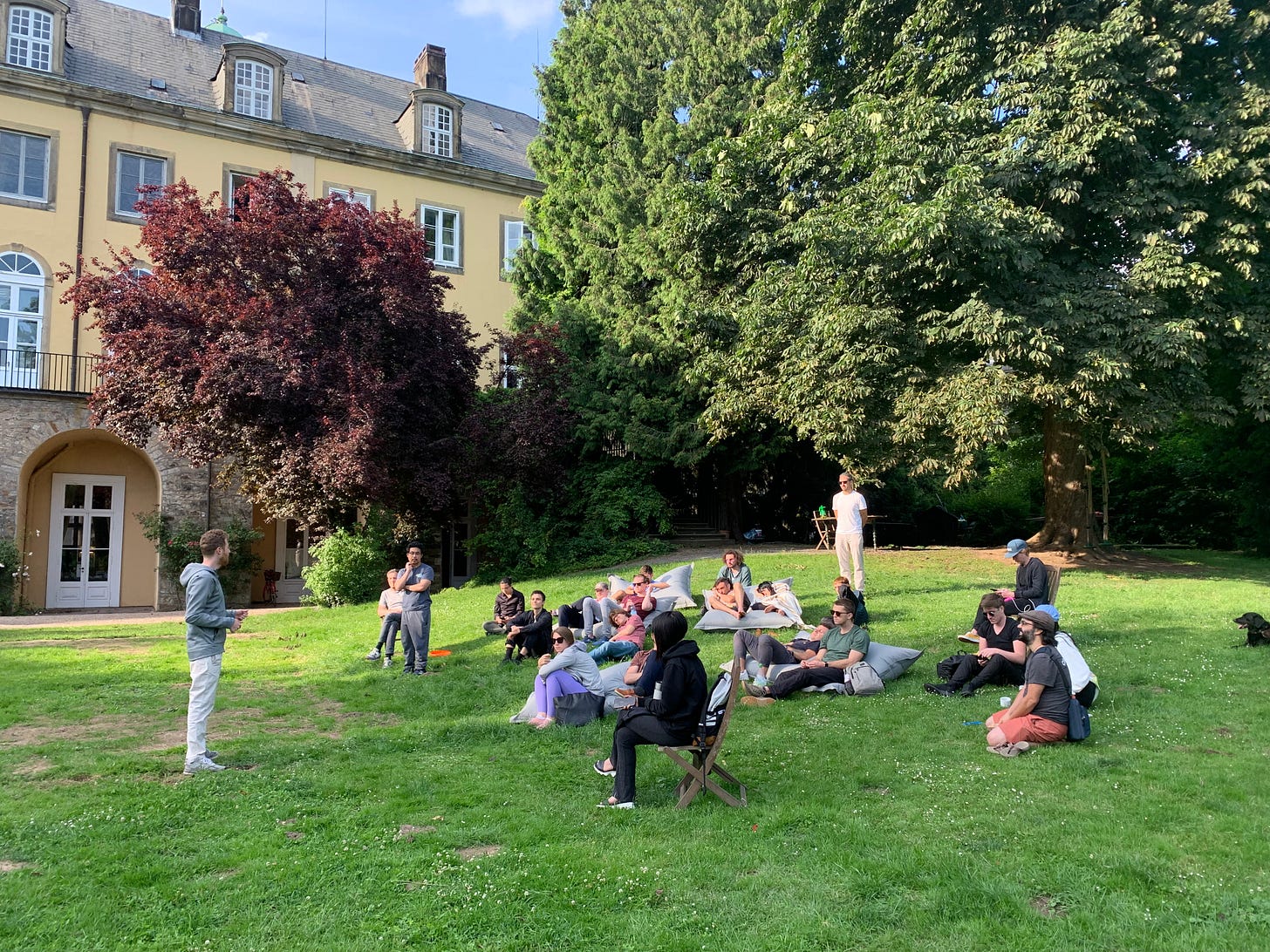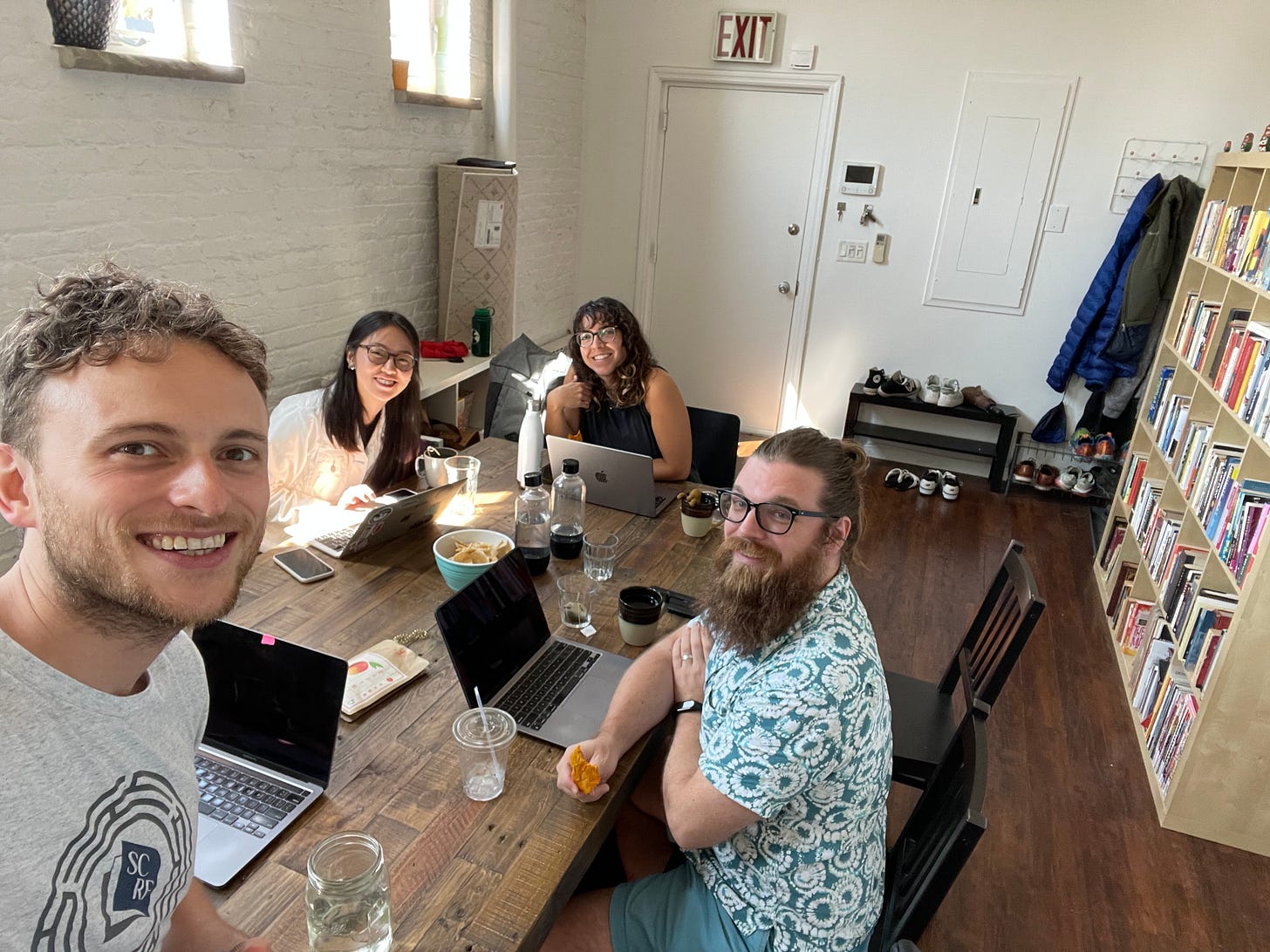Metagov News (July 2023)
DWeb, AI commons, collective governance pilots, membership circles, and upcoming seminars
Hi Metagovernors,
Welcome to our Project Updates newsletter! This is our roundup of project updates happening across Metagov.
Project Updates
DWeb Camp
Metagov returned to DWeb Camp for our second year in a row. Watch this video to see what we got up to last year!
This year we were a DWeb Sponsor, supporting the event by curating some of the camp’s governance and AI contributions.
AI Meets the Decentralized Web
What does the DWeb community talk about when they talk about AI? Perhaps more mysteriously, what brings an AI company like OpenAI out to the woods outside of San Francisco to talk about the decentralized web?
At this year’s DWeb Camp, we worked with OpenAI, the Internet Archive, and the Foresight Institute to curate a selection of AI speakers and workshops at DWeb Camp. The programming featured presentations by Aza Raskin (Centre for Humane Technologies), Jason Kwon (OpenAI), Che Chang (OpenAI), Rosie Campbell (OpenAI), Doc Searls, Stephen Hood (Mozilla), Philip Rosedale (Second Life), and many, many others. The planning was led by Allison Duettman of Foresight and Joshua Tan of Metagov, with critical support from Wendy Hanamura of the Internet Archive.
One of the key questions raised was the challenge and risks of open-source AI. For example, in Aza Raskin’s picture of possible AI futures, open-source might also lead us to a future where everyone, everywhere has access to the intelligence needed to design viruses, imitate public figures, or manipulate elections. Yet, in a conversation on open source AI models featuring Stephen Hood from Mozilla, James from Stability, Philip Rosedale, and Ting Ting Yue, everyone agreed that “the cat is out of the bag” when it comes to open source AI. Open source AI is already here, and it’s not going away.
We didn’t necessarily come away with a conclusion so much as a better sense of the question. From Josh’s closing remarks: “I honestly wrestle with this. I honestly do not know, and it feels weird, it feels very weird to be a student of the legends who built the open internet and ask, should [AI] be open? It reminds me of a question we ask ourselves as a liberal society—is it possible to be too open as a society? Do open societies ultimately bring about their own downfalls?”
Governance at DWeb
Can we trust our fellow “digital citizens”?
This session, led by Metagov contributor Jenny Fan, was a round table discussion around the provocation: can civic responsibilities for online “citizens” exist in an analogous way to how civic duties exist in offline communities? As one participant quoted, “The scarcest resource is legitimacy”, and appropriately, the conversation was framed in the context of the dearth of legitimate forms of community governance and content moderation for online communities. Though participants were not primarily governance researchers, we ended up with a comprehensive and thought-provoking survey of existing projects in this space.
We broke down the challenges of online “citizenship” around identity, reputation, intrinsic/extrinsic motivation, the issues of delegating trust to other users, and how the correlation between level of effort affected online community engagement. Participants mentioned references as wide ranging as existing political science research (liquid democracy, quadratic voting, radical markets), Web 2-adjacent projects (Periscope, Twitter community notes), Web 3-adjacent projects (Klairos, Nouns DAO’s zero knowledge voting, and one participant’s experience IRL at Zuzalu’s pop-up community), and more. In particular, users highlighted the challenges of shifting typically extrinsic motivators for civic behavior to intrinsic motivation, given the cost-incentive structure of the internet. As one participant put aptly, “The offline world is full of sticks, but the internet only has carrots.”
D20 Governance Playthrough
D20 Governance is a project focused on exploring modular governance through unstable communication environments and simulations. It aims to estrange the quotidian act of communication as a way of revealing ways in which interactions in online communities are infrastructurally prefigured by forms and norms of linguistic interoperability and implicit feudalism. D20 Governance aims to surface this revelation as a way of foregrounding the metagoverning architectures that order online communications, and catalyze experiences that empower communities to imagine and form more creative, flexible, experimental, and intentional patterns of self-governance. The current iteration of D20 Governance takes form as a Discord bot, and extends the composable governance mapping tool, CommunityRule. The D20 Governance working group is led by Janita Chalam, Val Elefante, Hazel, and Cent Hosten, and is supervised by Metagov research director Ellie Rennie.
For DWeb Camp we ran our first playtest with a group of 8 campers placed into a “Build A Community” simulation where they had to name their community, decide on an animating purpose, and decide on their first action. The play test had participants eloquently reciting Shakespearean recitations of their LLM transformed posts and revolting against consensus as a decision making mechanism. Stay tuned for future play test announcements in the newsletter.
Design Charrette on LLM LLC Governance Rules
The session, led by law.MIT.edu’s Dazza Greenwood, focused on an ongoing open source project developing an algorithmically managed LLC using LLM technology. This is similar to the Wyoming DAO LLC approach insomuch as there is a role for "algorithmically managed" LLCs, but there is no smart contract, blockchain, or decentralization involved. Rather, the algorithmic manager is an LLM operating according to "constitutional rules" encoded into the software running the manager operations and communications. The current codebase is designed as a Discord bot with email integration and is being tested and iterated against a handful of relatively legal and business use cases. The Metagov related aspect of this project is the architectural component where a set of rules governing the behavior and actions of the LLM LLC are specified. A DWeb Camp breakout group discussed the project overall and read aloud the current version of the Constitutional Rules, as the starting point for an engaging and constructive conversation and light design charrette. For more information, see the current code base, and this demo presentation of the project given to the Wyoming legislature.
Challenges and Triumphs in Community Self-Governance
This session, led by Metagov researcher Val Elefante, began with an overview of Metagov’s frameworks and tools including implicit feudalism, modular politics, CommunityRule, and a demo of CollectiveVoice. It was then followed by a rapid-fire collective brainstorm of challenges that communities face when it comes to online governance. Responses included: scale (from small to larger communities, from “not serious” to “serious” decisions), too many proposals, loss of institutional memory due to platform switching, not easy to experiment, and not many available models.
The group then brainstormed ways of solving some of these governance problems using modular governance frameworks including: a randomly-selected jury system for voting on proposals, organization and summary of relevant information for easy decision-making, improved deliberation formats, and using tech to facilitate in-person governance.
AI Palace & the AI Commons
Just a week after DWeb Camp, we hosted AI Palace, a week-long residency and unconference at Bueckeburg Palace in Germany where we schemed new institutions, infrastructure, and business models for open-source, public, and decentralized AI. Many Metagov researchers and community members were present, including Nick Vincent, Divya Siddarth, Bobi Rakova, Primavera De Filippi, Michael Zargham, and Joshua Tan.
Among other things, we developed a few new projects including
public AI, an advocacy effort being led by Josh, Nick Garcia of Public Knowledge, SJ Klein of Harvard, and others
fair trade data, a new infrastructure/business model being developed by Nick Vincent, Bobi Rakova of Mozilla, Andrew Peek of Delphia, and others
many models, a research program being developed by Josh, Nick V, and Jenia Jitsev of LAION
an AI Commons, to organize and coordinate all these projects
and many, many other schemes.
Look out for more updates in future newsletters!
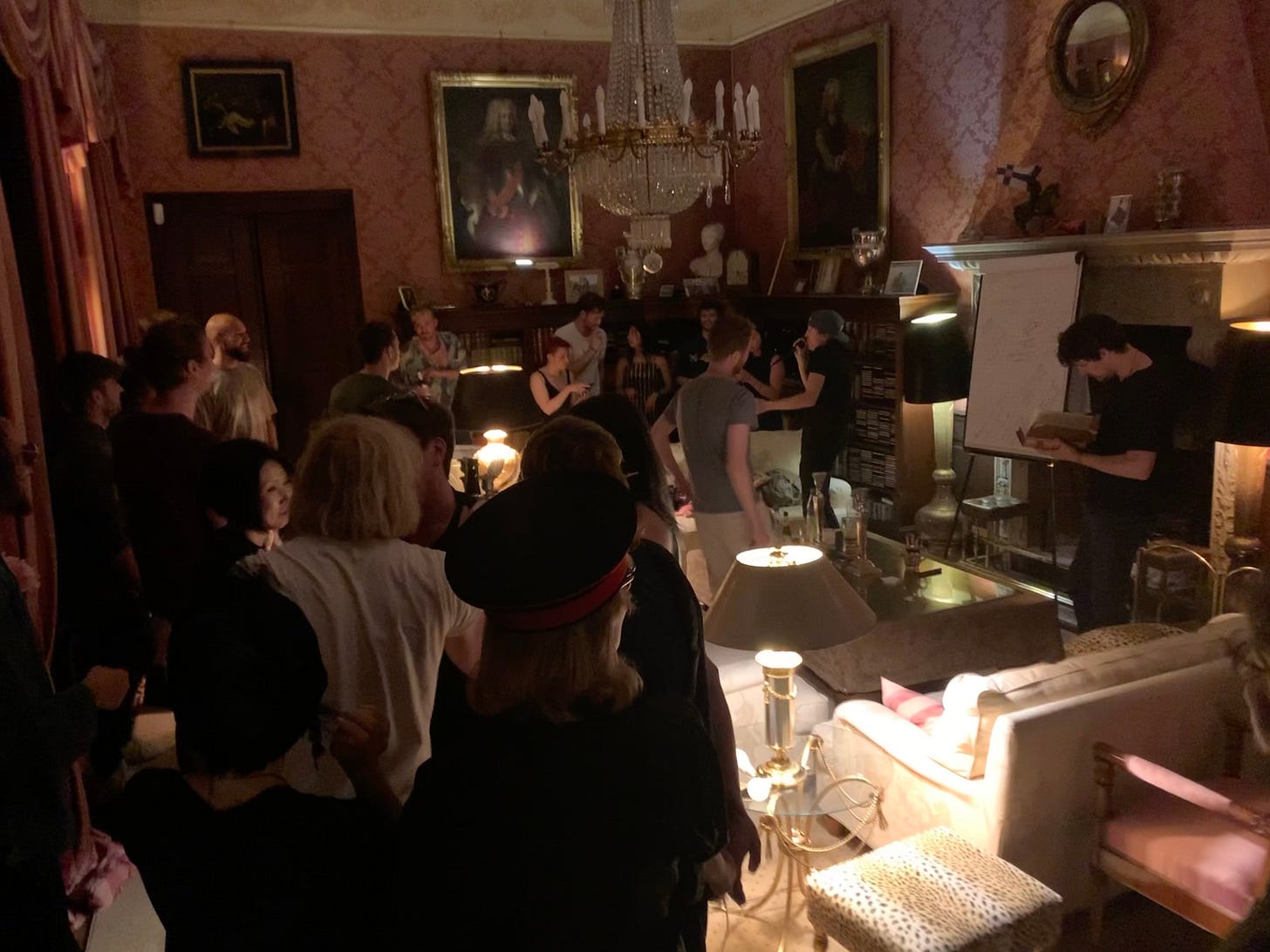
Thank you again to our sponsors for making AI Palace possible, including the National Science Foundation, Delphia, Ceramic, Seed Club, ID Theory, and the royal family of Schaumburg-Lippe. Also, much <3 to organizers Josh, Nick, Prima, and Teddy Schaumburg-Lippe as well as to our chefs Matt and Harry who (as they warned would happen) stole the show with their food.
Missed AI Palace? We will be organizing another one next year, this time led by Nick Vincent!
And btw, Divya Siddarth and our friends at Collective Intelligence Project have just released a call for a Program and Operations Manager to re-invent technology governance.
Long Term Projects
Governance Transitions
The Governance Transitions team represented Metagov at the International Association of the Commons Conference, the major meeting of scholars in the tradition of Elinor Ostrom. It occurs every other year, and was in Africa this year, for the first time, specifically Nairobi Kenya at the University of Nairobi. With Metagov contributor Isaac Mutemi, we put together a roundtable bringing together Kenyan thought leaders in the innovation/social media space to discuss the tensions inherent in operating between local and global knowledge commons, particularly over the power gradient of postcolonialism. We also met with Groundwork Fellow Wanjiru Ngure, also based in Kenya, to discuss plans for building community value within Nairobi’s underground experimental scene.
Other activities focused on governance transitions focused on conversations that brought together practitioners and academics interested in the challenges of governance change. Additionally, the governance transitions project saw postdoctoral scholar Nicholas Vincent land a tenure track position at Simon Fraser University in British Columbia. Those interested in this project can join #governance-transitions on the Metagov Slack (join here).
Calm Tech Standards
Work is being done on a model of models for calm tech. As calm tech expands to certify products, the team is asking “how can we make sure that everything is fractally similar?” The team is forming a model that can be used to understand and evaluate whether something is calm.
Calm tech research was also presented at DAO Palace and DISI (Diverse Intelligence Summer Institute).
PolicyKit, Gateway, and CollectiveVoice
CollectiveVoice is a feature on top of Open Collective that enables communities to decentralize decision-making power over expense submissions from individual Open Collective Admins to the wider group however the organization sees fit. Collective Voice is a no-code application of PolicyKit that uses the Metagov Gateway to connect Open Collective with Slack.
To roll out CollectiveVoice, we launched a pilot program where we are working closely with user communities to provide hands-on support during onboarding, testing, and policy experimentation while delivering feature requests, usability testing, and feedback. One of our user communities is a Boston-based mutual aid group called Mutual Aid Medford And Somerville (MAMAS).
We are looking for more communities interested in joining the pilot program! Mutual aid groups, open source software projects, and other collectives who use Open Collective and Slack are eligible to participate. If you are interested, reach out to Val at val@metagov.org.
We will also soon be starting usability testing for the no-code version of PolicyKit! The no-code version of PolicyKit is designed to empowers communities to author governance policies on top of the platforms they use (i.e. Slack, Discord, Reddit) effortlessly, and without any programming knowledge. We would love your valuable feedback on the user experience, interface design, and functionality as we refine our system and strive to meet the diverse needs of different online communities.
Please fill out this form if you are interested, and feel free to email the researcher Leijie Wang at leijiew@cs.washington.edu if you have any questions.
On-Chain Governance and DAO Research
Validator Commons
The Validator Commons (launched in 2022) intended to bring together validator service providers to create governance standards for proof of stake blockchains with on-chain governance. Metagov helped steward the project, including running a sortition experiment. In July 2023, Ellie Rennie attended the Blockchain Infrastructure Forum in Vienna, organized by Daniel Hwang (who also initiated the Validator Commons project). At the forum, representatives from validator service providers, data centers and blockchain foundations discussed current challenges in governance, infrastructure decentralization and regulation. Ellie is now working with others from the forum to produce a short report outlining the findings of the governance discussions, focusing on the merits of self-regulation and its alternatives, including redesigning on-chain governance processes.
DAOstar
DAOstar now has a Substack where they are posting news and reports. Check it out and subscribe.
The organization also went to DAO Palace this summer. Here are some photos from the events.


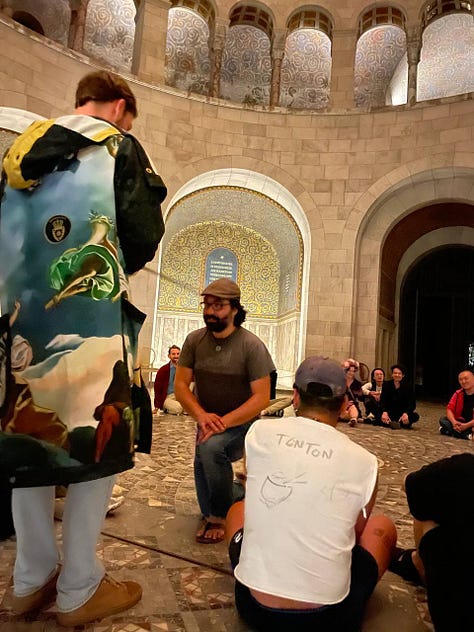

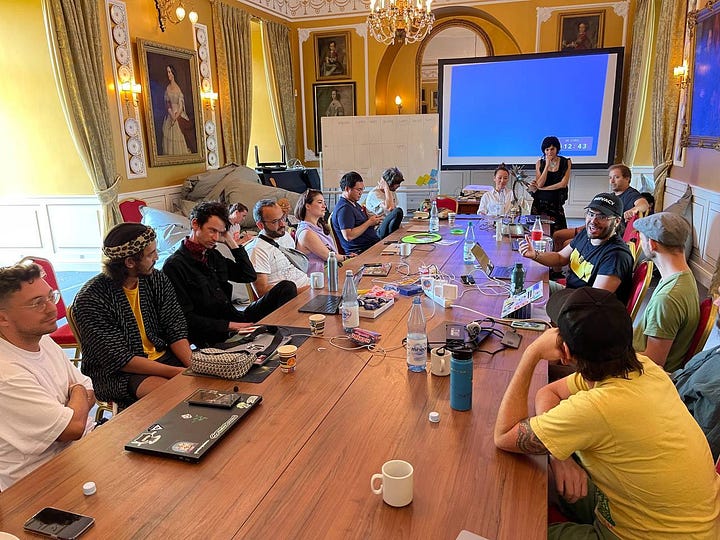
DAO Harvard Proceedings
Hazel has started publishing proceedings from April's three day conference, DAO Harvard. The first publication features Lawrence Lessig and Sandy Pentland remarking on the intersection of code and law.
DAO Harvard Proceedings - Part 1: Lawrence Lessig and Sandy Pentland Discuss Code and Law
DAO Harvard, which took place in April 2023, was a three-day conference bringing together practitioners, policymakers, and academics to discuss research, legal, and policy considerations of DAOs. Thank you to Harvard Belfer Center’s Technology for hosting us!
Gitcoin Rounds – Governance Research and More
Metagov is preparing to run a Governance Research Round via Gitcoin’s featured rounds. We’re soliciting expressions of interest in this round and have already had 26 researchers express interest. If you also want to express interest in this round feel free to fill out this Typeform.
If you have any questions in the meantime, reach out to Eugene Leventhal (@Eugene) in the Metagov Slack (join here).
Metagov Membership Program
This month our NYC Meetup and Community Newsletter circles share updates on their activities since forming earlier this year.
Consider becoming a member to continue to participate in and support these initiatives.
NYC Meetup
On Wednesday June 14th, the NYC Meetup Circle hosted its first event, a co-working session in Brooklyn. We had 5 people join over the course of 3 hours. It was a great opportunity to meet other community members. We had a mix of working and socializing (it was our first so a bit more getting to know each other and chatting governance interests). If you're interested in joining future events or proposing one, hop into the #nyc-meetup channel in slack (join here).
Curation Circle
In June the Community Newsletter membership circle kicked off our first community curation experiment here in the Metagov Slack! We’re aiming to provide an up-to-date view of what’s on the radar for the Metagov community, by using emoji-voting to surface interesting content. To participate, join the #community-curation channel, and share or vote ✨ on links of interest! If you are a member and want to actively take part in the community newsletter governance process, say hi in our circle at #circles-community-newsletter.
Metagov Seminar
Groundwork Fellowship
We’re happy to announce that the dates have been set for artifact presentations by our Groundwork Fellows. Check our seminar page and mark the dates for presentations from Ammar Manla Hasan, Michael Suantak, Wanjiru Ngure, ngọc triệu, and Stacco Troncoso. Our fellows have also been traveling and participating in conferences such as Beyond Growth in Brussels, Belgium; Digital Rights Asia-Pacific in Chiang Mai, Thailand; DWeb Camp in California, US; Mozilla’s Responsible AI Challenge, and the International Association for the Study of the Commons in Nairobi, Kenya.
Upcoming and Past Seminars
Upcoming
John Willshire, Interactive Workshop: Community Power Compass
Recent
Speaker John Ash and Dpax, On Cognicism
Daniel Kronovet, Chores: A 21st century chore wheel
Griff Green, Introducing Pairwise, a Tinder-like interface for ranked choice
Nick Kaufmann, Matt Crittenden, Steve Vitka, Metagov Short Talks
Daniel Golliher, On "Civics"
Noah Yeh, Frank Hu, First Contact: g0v/da0
Jieliang Yin, Metagov Short Talks
Han Tang, Introducing SeeDAO Governance
As always, a full archive of our seminars can be found on our Internet Archive page. Visit our Research Seminars page for the full schedule.
- -
And that’s it for this edition of Metagov News. As always, if you’re not already subscribed to our newsletter, you can sign up below.
If you’d like to join the group of metagovernors discussing these topics, you can visit our community website and complete our survey.
🌱
Cent
w/contributions by Aman, Case, Hazel, Val Elefante, Jenny Fan, Seth Frey, Dazza Greenwood, Eugene Leventhal, Ellie Rennie, Ronen Tamari, Josh Tan, and Leijie Wang






